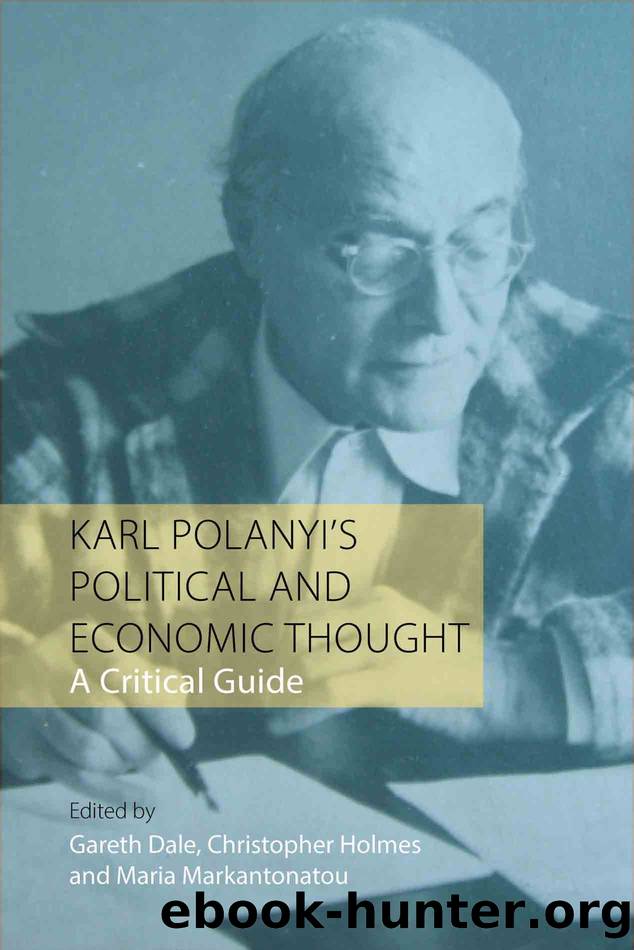Karl Polanyi's Political and Economic Thought: A Critical Guide by Gareth Dale

Author:Gareth Dale [Dale, Gareth]
Language: eng
Format: epub
Tags: Nonfiction, Social & Cultural Studies, Political Science
ISBN: 9780745658254
Google: 0qk9zQEACAAJ
Publisher: Wiley
Published: 2013-04-24T04:00:00+00:00
MONEY AS MEANS OF PAYMENT AND STANDARD OF ACCOUNTING
At a theoretical level, Polanyiâs formulation of money as a âtoken of purchasing powerâ is closely related to Knappâs theory of money, Chartalism, which had a lasting influence on several heterodox theories of money.53 The main proposition of Chartalism is that âmoney ⦠is a unit of account, designated by a public authority for the codification of social debt obligationsâ.54 This proposition rests, of course, on rejecting the idea that money is a medium of exchange âderiving its value from its metallic contentâ.55
The family resemblance between Polanyiâs approach to money and Knappâs Chartalism is not surprising, given that Knappâs book followed in the footsteps of the German historical school and commanded a considerable degree of authority in the German literature on money and monetary history.56 His primary work, The State Theory of Money, was first published in 1905 and went through multiple revisions.57 In this book, Knapp stresses that money as means of payment and unit of value is independent of the actual object that underpins commodity-money.58 The crucial quality of money is that debts and obligations are payable by using the particular object chosen as money, be it a metal or paper ticket. It is the political authority that lends âa use independent of its materialâ to this object.59
Overall, an unmistakeable element of Knappâs state theory of money is that it offers a sustained criticism of orthodox theories of money and in particular of both theoretical and practical metallism. Knappâs work offers a detailed account, both historical and theoretical, of how the acceptance by the public authority is the necessary factor in turning an object used as a means of payment into a generalized medium of exchange. Thus, Knapp upends the conventional causal account of money being primarily a medium of exchange that naturally evolved as commerce and market society developed in history.
The implications of such an argument can best be understood by contrasting it with the orthodox theories of money. In a classic theoretical article that influenced both Austrian and neoclassical economics, Menger60 captures the line of reasoning emblematic of orthodox theories of money:
Money has not been generated by law. In its origin it is a social, and not a state-institution. Sanction by the authority of the state is a notion alien to it. On the other hand, however, by state recognition and state regulation, this social institution of money has been perfected and adjusted to the manifold and varying needs of an evolving commerce, just as customary rights have been perfected and adjusted by statute law. Treated originally by weight, like other commodities, the precious metals have by degrees attained as coins a shape by which their intrinsically high saleableness has experienced a material increase. The fixing of a coinage so as to include all grades of value (Wertstufen), and the establishment and maintenance of coined pieces so as to win public confidence and, as far as is possible, to forestall risk concerning their genuineness, weight, and fineness, and
Download
This site does not store any files on its server. We only index and link to content provided by other sites. Please contact the content providers to delete copyright contents if any and email us, we'll remove relevant links or contents immediately.
International Integration of the Brazilian Economy by Elias C. Grivoyannis(100901)
The Radium Girls by Kate Moore(11987)
Turbulence by E. J. Noyes(7991)
Nudge - Improving Decisions about Health, Wealth, and Happiness by Thaler Sunstein(7669)
The Black Swan by Nassim Nicholas Taleb(7068)
Rich Dad Poor Dad by Robert T. Kiyosaki(6539)
Pioneering Portfolio Management by David F. Swensen(6264)
Man-made Catastrophes and Risk Information Concealment by Dmitry Chernov & Didier Sornette(5962)
Zero to One by Peter Thiel(5743)
Secrecy World by Jake Bernstein(4710)
Millionaire: The Philanderer, Gambler, and Duelist Who Invented Modern Finance by Janet Gleeson(4432)
The Age of Surveillance Capitalism by Shoshana Zuboff(4257)
Skin in the Game by Nassim Nicholas Taleb(4211)
Bullshit Jobs by David Graeber(4150)
The Money Culture by Michael Lewis(4147)
Skin in the Game: Hidden Asymmetries in Daily Life by Nassim Nicholas Taleb(3966)
The Dhandho Investor by Mohnish Pabrai(3731)
The Wisdom of Finance by Mihir Desai(3703)
Blockchain Basics by Daniel Drescher(3545)
